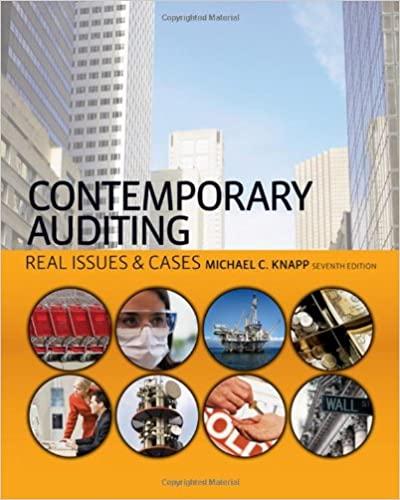Question
The Securities and Exchange Commission is concerned about CEOs who use company- owned airplanes for personal travel. For example, consider a CEO who uses his
The Securities and Exchange Commission is concerned about CEOs who use company- owned airplanes for personal travel. For example, consider a CEO who uses his employers Gulfstream V luxury airplane to transport his family on a 2,000 mile roundtrip vacation from New York City to Orlando, Florida. The standard practice among companies with personal travel reimbursement policies would be to charge their CEO $1,500 for this flight based on a per-mile reimbursement rate established by the Internal Revenue Service (the IRS rates are meant to approximate the per-mile cost of a first-class ticket on a commercial airline). However, critics argue that using IRS reimbursement rates grossly understates the flight costs that are borne by shareholders. Some of these critics claim that the $11,000 incremental cost of the flight, including fuel, landing fees, and crew hotel charges, should be reimbursed by the CEO. Still others argue that even basing reimbursements on incremental costs understates the true cost of a flight because fixed costs such as the cost of the airplane, crew salaries, and insurance should be included. These costs are relevant because the excessive amount of personal travel by corporate executives essentially requires their companies to purchase, insure, and staff additional airplanes. This latter group of critics argues that the relevant cost of the trip from New York City to Orlando is $ 43,000the market price that would have to be paid to charter a comparable size airplane for this flight. What is the relevant cost of this flight? Should shareholders expect their CEO to reimburse $ 0 (as is the practice at some companies), $1,500, $11,000, or $43,000? Or, should all companies disallow personal use of corporate assets?
What is the right answer to the question posed at the end of the inset regarding the appropriate reimbursement (or whether the practice should be disallowed)?
What are the ethical considerations, if any, associated with allowing executive use of corporate assets for personal purposes? What are the ethical implications, if any, of limiting such a perk to just executives? Should any company employee be able to avail him- or herself of similar perks? Justify your answer.
Is it possible for shareholders to discern the dollar cost to the company of executive perks such as the one described in this inset? If so, how/where can they find such information? If not, do shareholders have a right to know the dollar cost? Should they care? Justify your answer.
Step by Step Solution
There are 3 Steps involved in it
Step: 1

Get Instant Access to Expert-Tailored Solutions
See step-by-step solutions with expert insights and AI powered tools for academic success
Step: 2

Step: 3

Ace Your Homework with AI
Get the answers you need in no time with our AI-driven, step-by-step assistance
Get Started


